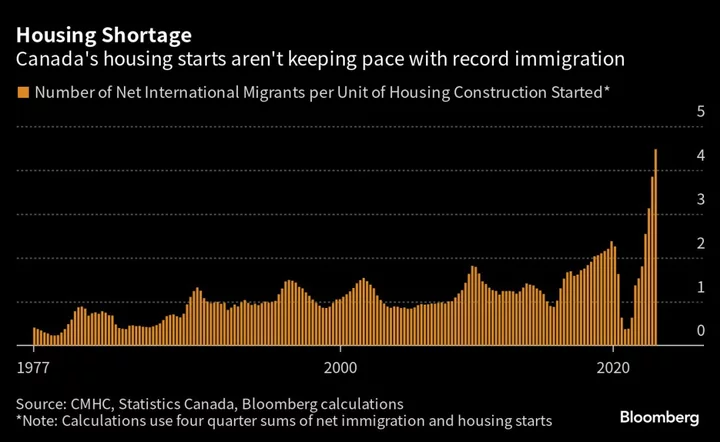The soaring cost of Canada’s housing has become a major political problem for Prime Minister Justin Trudeau as his chief rival zeros in on generational grievances over affordability.
Trudeau has played defense on the issue this summer, appointing a new housing minister last week and shifting some of the blame to other levels of government on Monday. But with his party already sinking in recent polls, housing has become a serious vulnerability for Trudeau.
“Failure to be seen as doing enough on housing could be politically disastrous for the Liberals,” said David Coletto, chief executive officer of polling firm Abacus Data.
The issue is particularly important for Canadians under 40 years old — a critically important demographic that Trudeau’s party couldn’t have won the last two elections without, Coletto said. His firm’s most recent poll put Pierre Poilievre’s Conservatives 10 points ahead of the Liberals.
The benchmark price for a Canadian home has more than doubled over the past decade, reaching C$760,600 ($572,470) in June. Trudeau’s government, which took power in 2015, has also steadily raised its annual immigration targets, with more than one million people arriving last year, straining an already tight housing supply.
Poilievre has hammered Trudeau on the issue, focusing on the anger of younger generations. Canada’s housing affordability is among the worst in the world, he told reporters Tuesday outside the Parliament building in Ottawa.
“Rent has doubled,” he said. “Mortgage payments, doubled. Needed down payments, doubled. All after eight years of Justin Trudeau.”
To be sure, skyrocketing housing costs have many causes beyond Trudeau’s control. Provinces and cities — responsible for land-use planning, zoning and permitting — bear some of the blame, as do real estate investors, foreign buyers, years of rock-bottom interest rates and other factors.
Still, Canada’s ambitious immigration targets have outpaced home building, aggravating the imbalance between demand and supply. In the 12 months to March, 4 to 5 international migrants arrived in Canada for every newly started unit of housing construction. That’s the highest ratio of new Canadians to new homes on record in data going back to 1977.
Poilievre, however, repeatedly sidestepped reporters’ questions on Tuesday about whether he would reduce immigration targets.
Former Liberal lawmaker Adam Vaughan, who helped craft Trudeau’s C$82 billion national housing strategy released in 2017, argued the country is better off today than it would have been without his party’s policies. If it had done nothing, federal spending for social housing this year would have been just C$1 billion, he said.
However, more needs to be done, and time would be better spent focusing on solutions across levels of government than laying blame, he said. Trudeau’s comment on Monday that housing isn’t a primary federal responsibility was “problematic,” Vaughan said.
“It is a responsibility of the federal government, if not literally then it is politically, and I would argue that it is morally,” said Vaughan, who now works at public relations firm Navigator.
The federal government has a range of tools it could use to address the housing shortage without swelling its debt, said Mike Moffatt, senior policy and innovation director at the Smart Prosperity Institute.
Those measures include targeting immigration policy toward construction workers, electricians and others who could boost housing supply and slowing down international student visa approvals until provinces require universities to build more housing for them.
If the government is going to act, “they better do so quickly because time’s not on their side, and there’s a chance that one of the opposition parties could really start to own this issue,” Moffatt said.
Marci Surkes, who formerly worked as Trudeau’s policy director, said she suspects the government is working on a housing plan as a central plank of its fall budget update.
“This should be ground that the Liberal Party should be occupying and owning,” said Surkes, who now works as an adviser to the Compass Rose Group. “They should have been making progress that was feeling more tangible at this point. And yet the circumstances being what they are economically, whatever progress has been made to date certainly doesn’t feel like enough.”
New Democratic Party Leader Jagmeet Singh, whose party has agreed to prop up the Liberal minority government in Parliament, said on Tuesday that Trudeau’s “finger-pointing” isn’t going to solve the housing issue, even though all orders of government hold some responsibility.
“We can’t ignore significant levers that the federal government has,” he said. “The levers are so significant that I would say the federal government has incredible powers to actually solve this problem if they choose to do so.”
Author: Laura Dhillon Kane, Brian Platt and Erik Hertzberg

